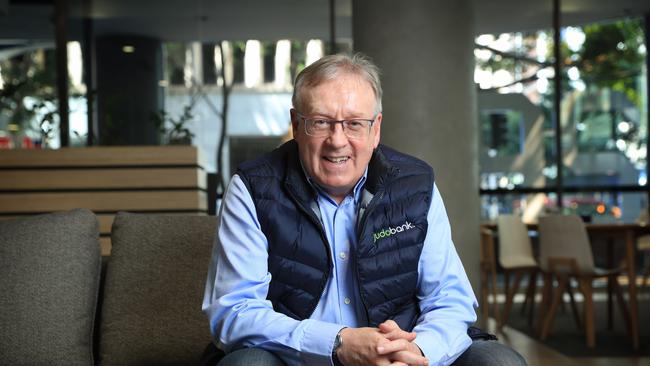SME lender Judo warns of most complex environment ever as investors punish shares
Judo boss Joseph Healy says Australian businesses are operating in the most complex environment ever, facing multiple challenges at home and from overseas.

Australian businesses are facing the most complex environment ever, not only from the sharpest increase in interest rates and highest inflation in decades but also from challenges posed by the energy transition, staff shortages, remote working, and the implications of a slowing Chinese economy.
That is the view of banker Joseph Healy, who as chief executive of Judo Capital heads the only Australian bank exclusively focused on small and medium businesses.
“You could argue that the environment has never been as complex as it is today for businesses small and large,” told The Australian on Thursday after posting its second set of full year result since listing in 2021.
“The economy is adapting to higher interest rates that we‘ve seen in a number of years and higher inflation than we’ve seen in decades,” he said.
That, he added, would be quite challenging in itself, “but then of course businesses are having to grapple with a whole range of other pressures.”
“The energy transition, climate change and adapting to ESG principles – there’s a whole range of factors, and it just adds to the complexity of the environment that we’re having to cope with beyond the next 12 months.”
Since getting a banking licence in 2019, Judo has taken advantage of the past mistakes and scandals at the big four banks to build its business and now lends to nearly one out of every hundred small businesses.
But Mr Healy’s comments came as the start-up was enduring the worst market sell-off since listing in 2021.
Shares lost a fifth of their value as investors dumped the stock when brokers warned of double digit downgrades to the current financial year profit’s due to higher funding costs.
“It‘s perplexing,” Mr Healy said of the market reaction.
”We have been really clear right from November 2021 that we are managing this company to our at scale metrics,” he said, referring to Judo’s medium term targets including growing its lending book to up to $20bn with lending margins above three per cent.
“Every forecast that we have made as a company, we have met or exceeded.”
Judo posted an eightfold increase in net profit for the financial year ending June 30 to $73m, slightly behind the $74.4m expected by stockbrokers polled by Visible Alpha.
Net interest margins – what it gets from loans minus what it pays for funds – rose to 3.34 per cent in the second half and 3.29 per cent during the year, a better result than expected. And its underlying 3.53 per cent in underlying NIM, which excludes some investment in government bonds, also surpassed its self-imposed target.
Judo is the only so-called challenger lender that has been able to succeed in confronting Australia’s banking oligopoly. Attempts by others such as Volt bank, Xinja and 86,400 in recent years ended in abrupt exits or takeovers by the big four banks.
Citi analysts said Judo’s financial performance had “been exceptional with the business model continuing to demonstrate high growth at a stable margin,” at a time peer banks are struggling with substantial margin declines.
But the challenging outlook for businesses meant Judo would not match the growth it had this year, where loans increased 46 per centto $9bn, more than eight times faster than the expansion in the broader banking system.
“You are not going to expect all businesses to necessarily be borrowing given an uncertain economic outlook,” Mr Healy said.
The bank had a lending pipeline of about $1bn and Mr Healy told analysts that expecting its loan book to grow by between $2.5bn to $3bn in the year was “a fair assumption.”
However, Judo flagged margins would contract this financial year as funding costs would rise given ultra cheap loans provided by the RBA during the pandemic would have to be replaced with much more expensive wholesale funding and term deposits.
That, combined with expectations for higher costs, will likely lead to profit downgrades of over ten per cent, analysts warned.
As part of its results announcement, Judo said it had increased its provisions for bad loans as it expected an “uneven” soft landing of the economy in the coming months.
Businesses dependent on discretionary spending such as hotels, restaurants, cafes, gyms and other recreational businesses – as well as those in the construction sector – would be much more impacted.
“We are very conscious that the journey into 2024 is going to present challenges across the economy. We are working on the assumption that the Australian economy will see a soft landing … but it’ll be uneven.”
“There’ll be soft pockets in the economy and we are going to have to be quite careful about our credit assessment,” he said.
He said that given Australia’s economic links with China, the recent slowdown in the world’s second economy was an emerging concern.
“(It’s) not something we should be dismissive of in terms of its implications in a macro sense, domestically,” he added.
Impairment charges rose to $53.6m, more than double the previous year and slightly higher than expected, reflecting an increase in impaired loans, but actual write-offs had been “limited” at $0.3m from ”a single customer group”.
Judo’s shares closed 19.76 per cent lower at $1.02, a record low and less than half of its IPO price of $2.10 per share.




To join the conversation, please log in. Don't have an account? Register
Join the conversation, you are commenting as Logout